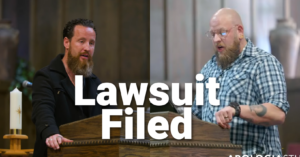Alistair Begg recently appeared with the Expositors Collective to, among other things, rehash and recast the controversy that erupted in early 2024 over his recommendation that a Christian grandmother attend her transgender granddaughter’s “wedding” in order not to be seen as judgmental.
Alistair Begg on the controversy that ensued after he gave some advice to a godly grandmother:
— Expositors Collective (@expositcllctv) August 18, 2025
(complete episode coming out tomorrow) pic.twitter.com/Ie88rZe3jl
Pastor Alistair Begg says Christians should attend gay weddings and even buy the couple a gift, lest they come across as 'judgmental' or 'critical'. See the story at https://t.co/DIXQxYrViM pic.twitter.com/cP18Xny1pc
— Protestia (@Protestia) January 18, 2024
In the interview, Begg sadly blames “some enterprising soul in his basement with a microphone” who “found it” for exposing the horrible advice, and rips Christian golf buddies for making podcasts to correct his error rather than picking up the phone to verify that what he said on the radio was indeed what he said. Begg claimed not to know the basement guy, but claimed the headline used was “Alistair Begg Endorses Gay Marriage,” an entirely unsubstantiated claim.
With the clear bad blood still boiling over the almost two-year-old issue, you’d be forgiven for thinking Begg was engaging in reputation-restoring spin, but upon a careful examination of his 2023 book that was the subject of the infamous radio interview, it is clear that Begg is merely sticking to his theological guns.
Begg’s Consistency
In his book A Christian Manifesto and subsequent public comments, Alistair Begg has advanced teachings on love, justice, and judgment that represent significant departures from biblical doctrine. While Begg remains respected for his expository preaching, his counsel regarding attending same-sex weddings and the errant framework that informed it reveals dangerous errors. Sadly, these errors are not isolated slips of the tongue but seem to be entirely consistent with his book’s misapplication of Scripture.
The three key areas where Begg’s teaching goes astray:
- His distortion of Christ’s command to love our enemies.
- His unbiblical distinction between “doing right” and “doing good.”
- His relativizing of Christ’s command, “Judge not,” into a matter of tone rather than a reciprocal standard for judgment.
Love for Enemies vs. Love for Friends
Begg frames Christ’s command in Luke 6 — “Love your enemies” — as an elevated standard of love beyond the second great commandment to love one’s neighbor as oneself (Matt. 22:39, Lev. 19:18).1 In practice, this collapses into treating all people, friend or enemy, believer or unbeliever, identically, rather than loving each as they ought to be loved.
Biblically, the application of love is distinct in scope and application:
- Love of neighbor: Doing what is righteous toward those within our relational reach (Luke 10:27; Gal. 6:10).
- Love of the brethren: A new commandment given by Christ, marked by sacrificial love for fellow believers (John 13:34–35).
- Love of enemies: Refusing vengeance, blessing those who curse us, and praying for persecutors (Matt. 5:44).
By flattening these categories into an ill-defined, universal “equal treatment,” Begg removes the practical distinctions that scripture itself maintains. Worse, he allows the perception of unbelievers (“what impression are we leaving?”2) to define what is loving, rather than God’s revealed standard. This underlies his infamous counsel that a Christian grandmother should attend her transgender grandchild’s same-sex “wedding” so as not to appear judgmental — advice which contradicts biblical fidelity.
False Distinction Between “Right” and “Good”
In A Christian Manifesto, Begg asserts that Jesus calls his followers “not simply to do what is right, but what is good.”3 This introduces a false dichotomy foreign to Scripture.
The Bible never separates righteousness from goodness. God’s law is “holy and righteous and good” (Rom. 7:12). To obey God’s commands is both right and good; to disobey is both wrong and evil. To invent a higher category of “good” works, beyond what God requires, is to blur obedience with sentimentality.
This error opens the door for framing certain actions — say, attending a same-sex wedding — as good acts of compassion, even though they directly contradict the right application of biblical truth. In effect, this allows a situational ethic that a believer can shift as they see fit (Begg himself reveals that if the people, situation, or question were different, he may give completely different advice).
Misuse of “Judge Not”
Begg further undermines biblical categories by teaching that Christ’s words in Luke 6:37 (“Judge not, and you will not be judged”) refer mainly to attitude — the spirit in which judgment is rendered.4 According to Begg, believers must judge, but with humility and kindness, avoiding harshness.
While it is true that hypocritical judgment is condemned (Matt. 7:1–5), Christ’s point is not about tone. Rather, Christ is reminding us that the commandment to love our neighbors is based on a reciprocal, as yourself standard – one God had provided. Scripture consistently demands that we use God’s Word as the standard in judgment — beginning with ourselves and extending to the church (John 7:24; 1 Cor. 5:12–13). To reduce Christ’s warning to a matter of subjective demeanor undermines the necessity of righteous, consistent judgment by God’s revealed law.
The Practical Consequences
These theological errors converge in Begg’s stubbornly maintained counsel to attend a same-sex wedding:
- Love distorted and relationships idolized: Compassion is defined by the sinner’s impression, not what God commands.
- Right vs. good confusion: Doing what is “good” (showing kindness by presence) is pitted against doing what is “right” (obeying God’s Word by refusing approval).
- Judgment neutered: Instead of faithfully applying God’s standard, Christians are urged to avoid appearing judgmental as an evangelism strategy.
The result is an evangelism of accommodation — an attempt to win sinners by softening the seriousness of lawbreaking and therefore the offense of the cross, rather than calling them to repentance and faith.
Alistair Begg’s teaching on love, justice, and judgment is not a mere pastoral misstep but the product of a flawed theological framework. By collapsing biblical categories, introducing false distinctions, and prioritizing appearances over obedience, he has opened the door to unbiblical compromise.
Christ calls his people to a different path:
- Love defined according to God’s commands and biblical prescriptions, not human impressions.
- Good inseparable from what is right.
- Judgment rendered by God’s standard, beginning with ourselves.
Faithful Christians must resist the temptation to “love” in ways that deny the truth. Genuine compassion refuses to affirm rebellion against God, compromise our witness, or send weak and confusing messages about where our true allegiance lies – particularly in light of the fact that it is the Spirit who calls, not our compassion. True goodness cannot contradict righteousness. And real humility in judgment is not silence, but fidelity to the Word of God.
- Alistair Begg, A Christian Manifesto: Recovering the Truth in an Age of Moral Compromise (Chicago: Moody Publishers, 2023), 26. ↩︎
- Ibid., 29. ↩︎
- Ibid., 22. ↩︎
- Ibid., 49. ↩︎






















One response to “Alistair Begg’s Open Evangelism”
If righteousness and goodness (and what’s loving) were not one and the same, then the commandments of God would be grievous. The implication would be that God’s commandments are unloving, and therefore that He would be unloving. Because God is perfectly righteous, good, and loving, his commandments are perfectly righteous, good, and loving …
“2 By this we know that we love the children of God, when we love God and obey his commandments. 3 For this is the love of God, that we keep his commandments. And his commandments are not burdensome. ” – 1 John 5:2-3
As far as the condescending, prideful and puffed up claim that it was some no-name blogger in a basement, well maybe that’s just exactly who God wanted to use, and for very good reason …
’26 For consider your calling, brothers: not many of you were wise according to worldly standards,c not many were powerful, not many were of noble birth. 27 But God chose what is foolish in the world to shame the wise; God chose what is weak in the world to shame the strong; 28 God chose what is low and despised in the world, even things that are not, to bring to nothing things that are, 29 so that no human being might boast in the presence of God. 30 And because of him you are in Christ Jesus, who became to us wisdom from God, righteousness and sanctification and redemption, 31 so that, as it is written, “Let the one who boasts, boast in the Lord.” ‘ – 1 Cor. 1:26-31
He needs to own up to the fact that he was wrong, for the sake of all who were misled. A man truly called to the ministry would want to issue corrections when he is wrong, and would be eager to do so, understanding the importance, and that the eternal fate of others is at stake.